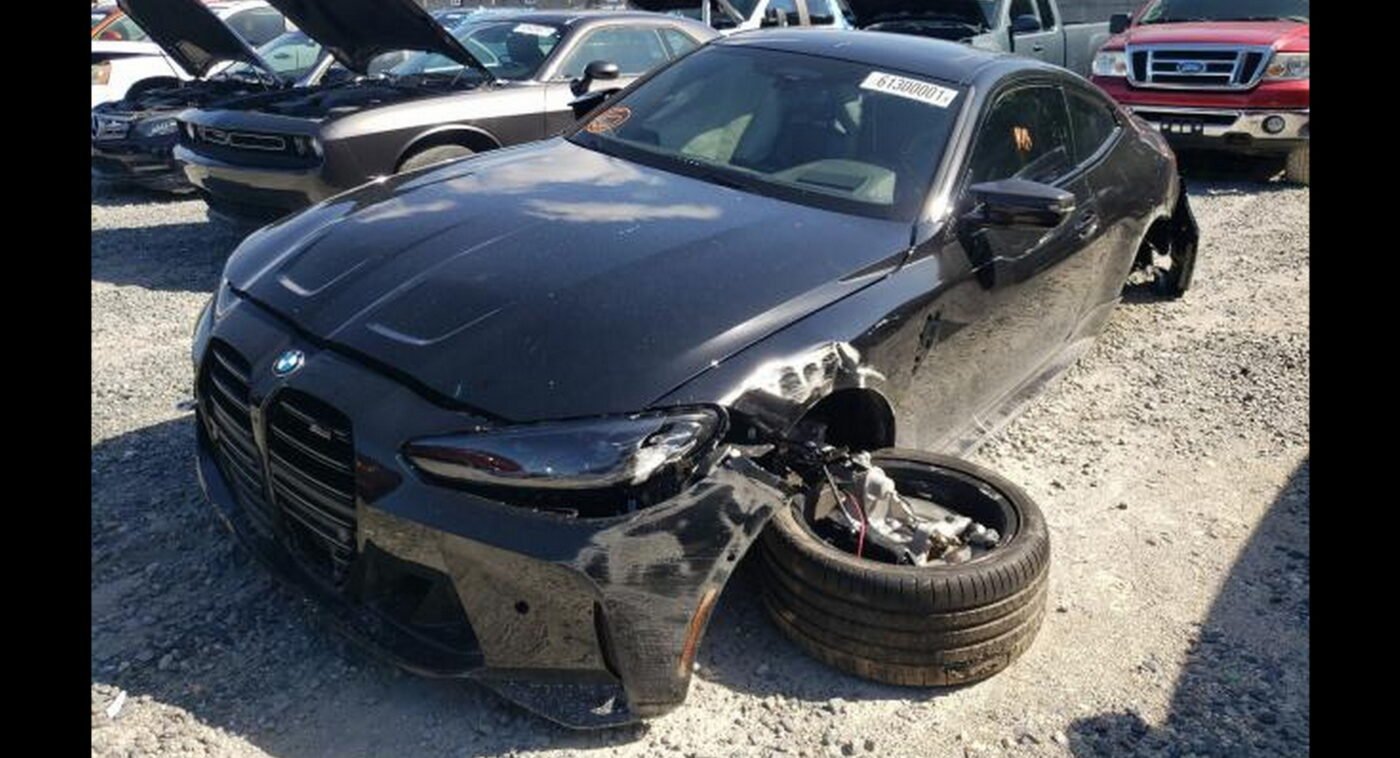Automotive
The Truth About Buying Salvage Title BMWs (2016-2025): Reliability, Repairs, and Model Insights

Understanding Salvage Titles
A salvage title is a designation given to a vehicle that has been significantly damaged, typically due to accidents, floods, or other events that substantially affect its structure or safety. When a car is deemed salvage, it means the cost of repair exceeds a certain percentage of its market value, prompting insurance companies to deem it a total loss. This classification process can affect various vehicles, including luxury brands such as BMW. The implications of purchasing a salvage title BMW can vary greatly depending on the specific circumstances surrounding the vehicle’s history and condition.
For potential buyers, understanding the classification of salvage titles is crucial. While some salvage title vehicles may be repairable and serve as a functional option, their histories can carry risks. When considering a wrecked repairable BMW, for example, it is essential to assess the extent of the damage, the repairs made, and whether all safety standards have been met post-repair. A thorough inspection by a certified mechanic can mitigate some concerns. The allure of purchasing a salvage title vehicle often stems from the potential for significant savings—many buyers wonder, “can you save money buying a salvage title BMW?” While the initial purchase price may be lower, ongoing maintenance and insurance costs can be higher for vehicles with salvage titles.
However, it is important to acknowledge the potential downsides. Questions such as “is it a bad idea to buy a salvage title BMW?” reflect widespread apprehension regarding long-term reliability and resale value. Certain insurance providers may also hesitate to offer coverage for salvage title vehicles, complicating the ownership experience. Thus, carefully weighing the benefits against the risks is imperative for anyone considering a salvage title BMW purchase.
Evaluating Reliability: Are Salvage Title BMWs Worth It?
The reliability of salvage title BMWs, particularly those from models manufactured between 2016 and 2025, warrants rigorous examination. Post-repair, these vehicles often exhibit unique challenges not present in their clean-titled counterparts. Common issues that arise include potential discrepancies in the quality of the repairs conducted and the sourcing of parts, which can impact long-term functionality and safety. Buyers need to pay careful attention to the specifics of the wrecked repairable BMW they are considering, as not all salvage titles are created equal.
A significant concern for many potential buyers is whether the savings associated with purchasing a salvage title BMW justify the risks involved. This question often hinges on individual perspectives towards reliability and performance. While it is possible to save money buying a salvage title BMW, the underlying condition and history of the vehicle are critical factors to assess. Expert opinions frequently highlight that salvaged vehicles can sometimes perform well if repaired by skilled professionals using high-quality parts. However, customer experiences vary widely, with some reporting satisfactory outcomes while others recalling persistent issues.
In conclusion, while salvage title BMWs from 2016 to 2025 can be reliable choices in some cases, potential buyers must examine the factors influencing their decision-making carefully. A prudent approach involves assessing both the quality of repairs and the associated risks, ensuring that the ultimate choice aligns with their budget and reliability expectations.
Choosing Between New and Used Parts for Repairs
When contemplating repairs for a salvage title BMW, one of the crucial decisions involves selecting between new and used parts. Each option presents distinct advantages and disadvantages that can impact both the overall cost of repairs and the long-term reliability of the vehicle.
New parts, although often more expensive, typically come with the assurance of a warranty, signaling quality and performance. For individuals who prioritize reliability, this can be a significant factor. New components are less likely to have hidden defects and are manufactured to meet or exceed original specifications. However, the investment in new parts can substantially increase the overall expenses associated with acquiring a wrecked repairable BMW, particularly if multiple components require replacement.
On the other hand, used parts represent a more budget-friendly alternative. Buying salvaged components can significantly reduce repair costs, allowing buyers to save money when restoring their salvage title BMW. However, it is essential to weigh the potential risks. Used parts may have a shorter lifespan and lack warranties, leaving owners vulnerable to future repairs down the line. It is imperative to source used parts from reputable suppliers who can guarantee their quality.
Ultimately, the decision between new and used parts should be influenced by several factors including budget constraints, the extent of necessary repairs, and personal comfort with risk. Owners should consider how much they are willing to invest in ensuring the reliability of their salvage title BMW. While it may be tempting to save on costs by opting for used components, ensuring that repairs are done correctly and with quality parts is critical to prevent future problems.
In conclusion, the choice between new and used parts is pivotal when repairing a salvage title BMW. Each option carries its own set of benefits and drawbacks; thus, careful consideration of long-term costs and reliability is necessary to ensure the best outcome for your vehicle.
Top 7 BMW Model Series from 2016-2025
The BMW lineup between 2016 and 2025 features several impressive model series that have captivated car enthusiasts and everyday drivers alike. Each series offers unique attributes in terms of performance, design, and technology, while also holding varying appeal in the context of salvage titles.
1. **BMW 3 Series (2016-2025)**: Renowned for its balance of performance and comfort, the 3 Series has consistently been a staple in the BMW range. It is often praised for its agile handling and refined interior. Buyers often consider “wrecked repairable BMW” models from this range due to their combination of sportiness and practicality, making them ideal for those seeking a reliable daily-driver.
2. **BMW 5 Series (2016-2025)**: This series epitomizes luxury and performance. With advanced features and a range of powerful engines, the 5 Series has a solid reputation for reliability. Many potential buyers might wonder, “can you save money buying a salvage title BMW” in this series, especially considering the model’s depreciation rates over time.
3. **BMW X3 (2016-2025)**: As a compact luxury SUV, the X3 offers versatility and a high driving position. Its reliable track record makes it appealing to those considering salvage title options, as even damaged versions tend to maintain strong resale value if adequately restored.
4. **BMW Z4 (2016-2025)**: The Z4 stands out for its sporty convertible design. Enthusiasts are often cautious about the implications of purchasing a “salvage title” sports car, but the Z4 can be an exceptional find for those ready to reinvest in repairs.
5. **BMW X5 (2016-2025)**: This mid-size luxury SUV combines ample space with an array of advanced technology. Its popularity prompts inquiries into whether “is it a bad idea to buy a salvage title BMW” X5, especially considering the cost to repair or restore such vehicles.
6. **BMW 7 Series (2016-2025)**: Representing BMW’s flagship offering, the 7 Series excels in luxury and performance. Buyers interested in the salvage title market often look here due to the potential significant savings available on models with minor damages.
7. **BMW M3 and M4 (2016-2025)**: The M models are highly sought after for their performance capabilities. The allure of driving a high-performance vehicle drives many to explore salvage title options in these series, balancing the thrill of owning an M3 or M4 with the careful consideration of repairs.
Each series offers distinct benefits and considerations for buyers interested in salvage title options, emphasizing the importance of thorough research and vehicle inspection prior to a purchase.
Understanding High Mileage: What’s Considered High Miles for BMWs?
When evaluating a used BMW, especially one with a salvage title, understanding what constitutes high mileage is paramount for prospective buyers. The baseline for high mileage in BMW vehicles can vary significantly depending on the specific series and engine configuration. Typically, vehicles that have surpassed 100,000 miles may be considered high mileage, but this number can shift based on model-specific factors.
For instance, BMW 3 Series vehicles, known for their sporty performance, may generally remain reliable well into the 120,000 to 150,000-mile range, particularly if they have been well maintained. On the other hand, larger models like the BMW 7 Series may begin to experience increased wear and tear as early as 80,000 miles. It’s essential to account for these nuances when contemplating the purchase of a wrecked repairable BMW, especially those with a salvage title.
High mileage can directly impact various factors such as engine performance, transmission reliability, and the overall longevity of critical components. As BMWs age and accumulate mileage, they tend to demand more frequent repairs and maintenance, which can escalate repair costs. Buyers often wonder, “Can you save money buying a salvage title BMW?” While the initial purchase price might be lower, the ongoing repair costs for high-mileage vehicles can offset savings. Newer models, particularly from 2016 onward, may come equipped with advanced technologies that can influence both reliability and repair needs.
Thus, understanding these mileage benchmarks is crucial in determining whether a salvage title BMW is the right fit for your circumstances. It’s not merely about the numbers; it’s essential to intertwine the mileage with the model’s usage history and service records. Evaluating these aspects will help you answer the critical question: Is it a bad idea to buy a salvage title BMW? Being well-informed about mileage considerations enables buyers to make more educated decisions regarding these vehicles.
Mileage Notes: Factory Repairs and Maintenance Requirements
When considering the purchase of a salvage title BMW, it is critical to be aware of the specific mileage-related repairs and maintenance requirements that can arise as the vehicle ages. Each BMW model series, regardless of whether it has been previously wrecked or is classified as repairable, has its own set of factory recommendations tailored to maintain operational reliability over time. This understanding plays a pivotal role in determining whether it is wise to invest in a salvage title BMW.
As BMW vehicles accumulate mileage, common factory repairs often include the replacement of components that are subject to wear and tear, such as brake pads, rotors, and tires. For instance, models like the BMW 3 Series typically need more frequent brake maintenance after 50,000 miles, while the BMW X5 may require suspension inspections and lifts at comparable intervals. This variance highlights the importance of conducting a thorough inspection of a salvaged vehicle’s repair history to understand what maintenance has already been performed and what might be necessary shortly after purchase.
Additionally, preventive maintenance is essential in ensuring the longevity of any BMW, especially those with salvage titles. Regular oil changes, coolant flushes, and transmission inspections are imperative, often advised every 7,500 to 10,000 miles. Extended periods without service can lead to more significant issues that could negate the cost savings associated with buying a wrecked repairable BMW. Therefore, potential buyers must conduct diligence on past maintenance to ascertain the necessity and extent of future factory repairs.
Ultimately, investing in a salvage title BMW raises questions about reliability and potential costs associated with ongoing maintenance. Understanding the specific mileage expectations and factory recommendations for each model can significantly influence the decision-making process, potentially saving buyers from unexpected repairs and financial burdens. It is prudent to highlight that proactive maintenance can enhance the vehicle’s life and performance, regardless of its title status.
Real Customer Experiences: The Good, the Bad, and the Ugly
The decision to purchase a salvage title BMW can evoke a range of emotions and experiences among buyers. Many owners who have ventured into the realm of wrecked repairable BMWs share their stories, often highlighting both positive and negative aspects of their purchases. These testimonials can serve as valuable insights for potential buyers considering whether they can save money by buying a salvage title BMW.
On the positive side, several customers report having successfully acquired their salvage title cars at significant discounts, allowing them to own a luxury vehicle at a fraction of the original cost. One owner shared their experience of purchasing a salvage title BMW 5 Series. After a thorough inspection and repair, they found the car to be a reliable daily driver, proving that with careful assessment, a salvage title vehicle can meet the expectations of performance and comfort. This owner’s experience underscores the possibility of finding hidden gems in the salvage car market, particularly when there is potential for a solid repair plan and thorough verification of the car’s history.
Conversely, there are cautionary tales that highlight the potential pitfalls of buying salvage title vehicles. Some customers encountered unexpected repair challenges and costly maintenance issues that cropped up shortly after their purchase. A BMW X3 owner recounted how despite initial excitement, they faced ongoing problems that were not disclosed at the point of sale, leading to frustration and additional expenses. This highlights the question: is it a bad idea to buy a salvage title BMW? For some, it may prove to be a worthwhile financial decision, while for others, it can turn into a burdensome investment.
These real-life experiences can guide potential buyers in navigating the complexities of purchasing a salvage title BMW. While there are opportunities for savings, vigilance and comprehensive research are essential to ensuring a positive outcome.
Expert Insights: What to Look For in Salvage Title Vehicles
When considering the purchase of a salvage title BMW, it is crucial to approach the decision with caution and thoroughness. Automotive experts recommend beginning with a comprehensive inspection of the vehicle. This inspection should ideally be conducted by a qualified mechanic who has experience assessing salvage title vehicles. Look for signs of structural damage and ensure that the vehicle has undergone proper repairs. A thorough inspection may reveal underlying issues that could affect the vehicle’s performance and safety.
In addition to a professional inspection, it is essential to evaluate the vehicle’s repair history. Request detailed documentation of any repairs made to the wrecked repairable BMW. This information is vital as it provides insight into the quality of repairs conducted and whether genuine parts were used. Experts emphasize the importance of understanding how the vehicle was salvaged, as the cause of the salvage title can significantly influence the reliability of the car. For example, a BMW that suffered minor cosmetic damage may present a lower risk compared to one that endured extensive structural damage.
Another critical factor to consider is the potential for future costs. While purchasing a salvage title BMW may appear to offer savings, hidden costs can accumulate if the vehicle requires additional repairs or maintenance. It is worth asking the seller specific questions about the car’s history, including how long it has been on the market and whether any additional repairs are pending. Understanding these factors will help you assess whether you can save money by buying a salvage title BMW or if it is a bad idea in the long run.
Therefore, being informed and vigilant when purchasing a salvage title vehicle is critical. By following expert advice on inspections and inquiries, potential buyers can mitigate risks associated with purchasing a damaged car and ensure that they make a sound investment.
Get In Touch: Auction Vehicle Repair Estimates
When considering the purchase of a salvage title BMW, it’s prudent to have a clear understanding of the repair costs associated with these vehicles. One of the most effective ways to gain insight into potential expenses is by obtaining repair estimates from auction specialists. Contacting these professionals can provide prospective buyers with valuable information, helping them decide whether to proceed with the acquisition of a wrecked repairable BMW.
To initiate the process, interested buyers should reach out to reputable auction vehicle repair estimator services. These services typically offer both online and in-person consultations to assess damage and provide detailed estimates. A thorough evaluation of the vehicle’s condition, including necessary repairs and parts, is conducted, allowing for a more informed decision regarding the financial feasibility of the purchase. Most estimators will require information such as the vehicle identification number (VIN), the extent of the damage, and any specific concerns or inquiries about the salvage title BMW in question.
When searching for estimator contacts, it is essential to consider their experience and reputation in the field. Reading reviews and seeking referrals can lead buyers to professionals who specialize in assessing vehicles with salvage titles. Many of these experts work closely with insurance companies and auction houses, which can further streamline the process of obtaining accurate estimates.
Once estimates are received, potential buyers can evaluate whether the repair costs align with their budget and expectations. Understanding these costs is crucial, as they can impact whether one can save money buying a salvage title BMW or if it proves to be a bad idea altogether. By approaching this process with caution and utilizing professional insights, buyers can navigate the complexities of salvage title purchases more effectively.

